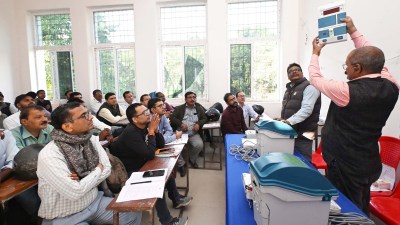Dalit groups in United Kingdom mobilise over delay in passing anti-caste legislation
Protest against delay that could postpone the passing of the bill until 2015
Dalit groups in the UK are mobilising forces once again to protest against the United Kingdom government’s move to delay the implementation of an anti-caste legislation
by two years,which will affect at least 400,000 people in the country.
The British Parliament had voted for caste-based discrimination to be outlawed in an amendment to the Equality Act 2010 in April this year,marking a major victory for campaigners,who had fought a protracted battle for a change in the law.
However,it emerged this week that Prime Minister David Cameron government’s consultation and legislative process to implement the amendment could take as long as mid-2015.
The Department of Culture,Media and Sport (DCMS),in charge of equality issues,announced that employers,public authorities and the judiciary would need to be involved in the discussions before such a change takes place.
“This is utterly disappointing and a sheer disregard of the British Parliament. It indicates that the government has no intention of putting into practise what the Parliament has already cleared,” said Davinder Prasad,general secretary of Caste Watch UK,one of the groups leading the campaign in favour of legislative action over caste discrimination in Britain.
“We are now mobilising once again and working on an action plan to put pressure on the government. There is a lot of anger within the community because the government has a duty of care towards the 400,000 potential victims of caste discrimination,” he added.
The issue has been an extremely divisive one,leading to lengthy parliamentary debates and a split within the Hindu groups in the UK.
The Alliance of Hindu Organisations (AHO) had been leading a counter-campaign against the legislation on the basis that the caste system is an issue that the “Hindu community would very much like to move beyond”.
It has now expressed delight that the government has paid heed to the views of “the majority British Hindu community” and allowed a full period of consultation.
“There are many issues of concern over this legislation and a proper period is needed to ensure that these issues are fully addressed,” said a spokesperson.
The latest two-year timeline suggests the legislation is unlikely to be in place before for the next general election in Britain,leading some to accuse the Conservative-led coalition of trying to push the issue off the agenda.
Lord Avebury,a Liberal Democrat member of the All-Party Parliamentary Group for Dalits and one of the key voices in favour of legislative action on the issue,said: “I suspect that the objective is to lengthen the process so that it stretches into the approach to the general election and then probably to announce that they will be introducing provisions in the manifesto to repeal the whole legislation.”
He pointed to a letter sent in May by Helen Grant,the government minister for women and equalities,to Gauri Das of the AHO. In it,she had written that “I made no secret at our meeting and nor do I now of my disappointment that it has been necessary for the government to concede to making an order to include caste as an element of race in the Equality Act 2010 following the further defeat in the House of Lords”.
It had prompted Lord Avebury to report Grant to Cameron for what he considers to be a breach of the ministerial code,which requires ministers to maintain a united front once decisions have been reached.
The Anti-Caste Discrimination Alliance called on the government to think of the victims of caste discrimination and get the legislation in place by the end of the year.
“Helen Grant’s office has confirmed what we feared most they have no interest in the equality of treatment and opportunity when it comes to actual and future victims of caste-based discrimination in this country,” he said.
The DCMS,however,stressed it was “entirely wrong” to suggest ministers had acted inappropriately on the introduction of caste discrimination legislation,adding that
Grant had met both sides for discussions.
“We want to ensure the issue of caste in the UK is fully understood,and therefore it is right that the government and its ministers discuss the issue of caste with a wide range of groups and encourage everyone to participate in the consultation,” a DCMS spokesperson said.
The government had commissioned the National Institute of Economic and Social Research (NIESR) to carry out research into the issue,resulting in a report in December 2010 entitled ‘Caste discrimination and harassment in Great Britain’.
It had pegged Britain’s Dalit or lower caste community between 50,000 and 200,000 and found that caste awareness was largely focused among people with roots in the Indian sub-continent.
The Equality and Human Rights Commission is now charged with further examining the nature of caste prejudice and harassment in the UK,the findings of which are to be tabled later this year.



- 01
- 02
- 03
- 04
- 05



























